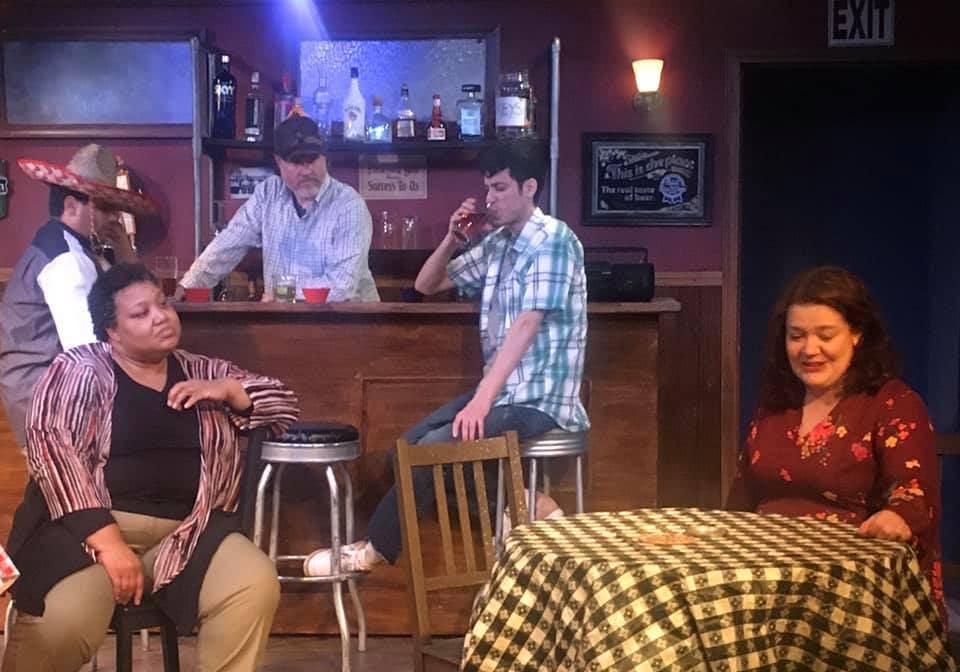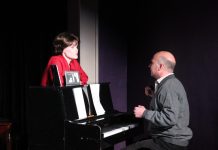I’ve never been to Reading, PA, the location of Lynn Nottage’s searing 2015 Pulitzer Prize-winning play, Sweat, now playing at Silver Spring Stage, but my life has been bracketed by living in or near hollowed-out industrial towns. I grew up in Buffalo NY (Bethlehem and Republic Steel closed in 1983-84) and now frequent Hagerstown MD (Fairchild Aircraft closed in 1984, Moeller Organ Company in 1993) and Martinsburg WV (Interwoven Mills and a major B&O railroad maintenance facility closed in 1976 and 1988). I recognize the people in Sweat. Nottage did substantial research in Reading, PA while preparing the script; and her feel for the setting and characters is spot-on.

My dad, part of the generation preceding that of the characters in the play, worked 43 years in the same unionized plant and retired with a defined-benefit pension and health benefits. That’s the life that Sweat’s characters expect; after all, that’s the life their parents and grandparents had lived. But now it’s 2000, and the regulars at a local bar have begun to feel nervous that the national wave of plant closings will hit home. Regular radio news reports establish the timeline for each scene, and excerpts from George W. Bush speeches set the wider political context.
Three longtime friends and co-workers on the factory floor are central to the action. Jessie (Amanda Jones), whose husband has left her for a younger woman, is sweet when not passed out drunk, once recalling her never-fulfilled dream of backpacking through Asia. Cynthia (Kecia A. Campbell), a Black woman, energetic and seeking a better life, does her best to maintain optimism and hope. Her ex-husband, Brucie (Neal Burks), though charming and realistic in his lucid moments, is far gone into addiction.
Tracey (Maura Suilebhan), whose husband was killed in the plant, already angry and bitter, becomes more so when Cynthia gets a supervisory job for which they both applied. Was it just because of affirmative action? Suilebhan delivers eloquently a monologue that could have come from a Studs Terkel oral history. As her escalating anger leads Tracey down ever-darker paths, her face and physicality reminded me painfully of women I see waiting for drug offense or child neglect hearings in the hallways of the Martinsburg courthouse, located in a repurposed building that once provided jobs as part of the Interwoven complex.
Tracey’s son Jason (Peter Moses) and Cynthia’s son Chris (Michael King), once best friends, have committed a terrible crime, the circumstances of which are not revealed until late in the play. In framing scenes set in 2008, the year of the Great Recession, the young men, having recently been released from prison, are questioned by a no-nonsense, but compassionate, probation officer (Anthony Coley, in a powerhouse two-scene role), as they try to comprehend what they did and why. Jason, never a smart or thoughtful kid, by 2008 is consumed by racism and covered with Aryan Nation tattoos. The quieter, more sensitive Chris has gotten religion and carries his Bible with him. Both are close to homeless.
Presiding over the bar – realistically designed by Lee Hebb, down to the Pabst Blue Ribbon signs – is bartender Stan (Ron Ward). A former worker whose days at the plant were cut short by a leg injury, Stan, more politically sophisticated than his patrons, tries to keep the peace among his customers, staying above the fray as best he can in a humorous, somewhat detached way. He is assisted by Oscar (Andres Felipe Roa), a Colombian-American, born in the U.S.A., who quietly, almost invisibly to the regulars, keeps the place clean.
When the plant begins closing, tensions increase rapidly. Cynthia is now part of middle management, having to give orders to her former equals, posting the notice that tells her friends that they are locked out. That makes her a traitor. Oscar takes a job as a replacement worker for the locked-out union members in order to make more money than he can at the bar, making him a hated scab. Tracey and Jason soon add a racial dimension to their anger at Cynthia and Oscar, leading ultimately to the violence (realistically and frighteningly choreographed by Sierra Young) that sends Jason and Chris to prison.
Director Matt J. Bannister’s work succeeds on several levels. He shapes the presentation of a play having a great deal of social and political content without allowing it to become didactic. He and the actors, in the play’s many scenes of high-intensity emotion, succeed in maintaining character while avoiding excess. With lighting designer Steve Knapp, he devised a fine scene change device, dimming the lights to a pale blue while actors remain on stage, in character, wordlessly finishing out scenes for a short time before exiting.
Sweat is ultimately a tragedy of a small group of characters in one small city standing in for the situation of millions of people made redundant by economic change and political decisions (Stan refers to NAFTA early on) that have rapidly, and radically, exacerbated inequality. It graphically illustrates the decline of union power and the devastating effects of that decline on workers. One interesting aspect of Sweat, arguably less generalizable, is that, by play’s end, the Black and Hispanic characters wind up in at least marginally more hopeful places than the “white working class” characters.
Shows focused on the situation of the poor and working-class have a long tradition, from adaptations of Dickens, to Clifford Odets and the Federal Theater Project, to Arthur Miller, and even to musicals like The Full Monty (set in post-industrial Buffalo) and Billy Elliot (set in the midst of a futile union action in British coal country). Sweat is an honorable member of that tradition, well presented by Silver Spring Stage, all the more important because it portrays, without undue judgment, the wellspring of resentments that color our present moment.
Running Time: Two hours and twenty minutes, with one intermission.
Sweat is playing at Silver Spring Stage, 10145 Colesville Rd, Silver Spring, MD, through November 23, 2019. For tickets, you can call 301-593-6036 or go online.





